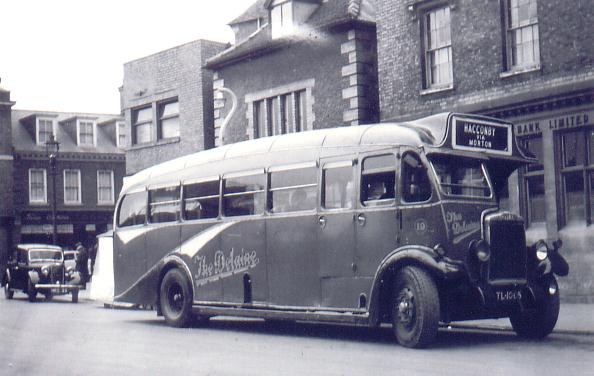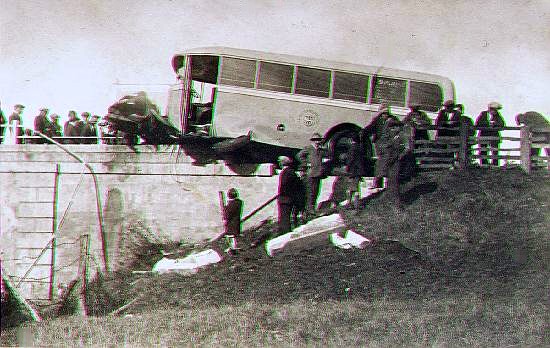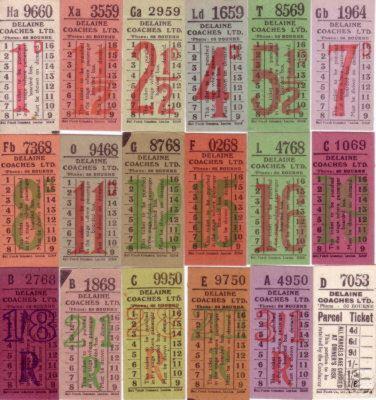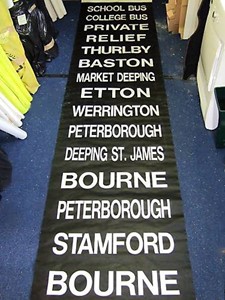|
Delaine
Buses

The Delaine
company's depot in Spalding Road.
The local bus company
known as Delaine Buses Limited has become a household name in Bourne and the smart blue and cream livery on its vehicles is a familiar sight in the town and district.
The history of the firm can be traced back to 1890 when William Smith, son of Bennett Smith, a general contractor, started carrying passengers by horse and cart to local markets. He died in 1913 but the company continued under the direction of his son Thomas Arthur Smith although he was only 17 when he took over. He introduced taxis and in 1919, the first motor bus was purchased, a Model Ford T, for under £300. It seated fourteen passengers and the return fare to Spalding was 1s. 9d. at a time when the average wage was thirty shillings or £1.50 a week. Daily services from Bourne to Peterborough, Stamford, Spalding, Sleaford and Grantham were all established by 1923 and two years later, the company was running regular excursions to the popular seaside resorts of Hunstanton and Skegness.
A depot fire in 1928 destroyed many of the early vehicles and ended the company's horse and cart operations. Replacement vehicles were loaned by other operators but a severe shortage of buses resulted in the Grantham service being dropped. By 1930, the company was again thriving and the introduction of the Transport Act led to Delaine becoming the sole operator on many local services including the trunk route between Bourne and Peterborough.
The premises in Spalding Road have been the company's headquarters since 1902. They were extended in 1934 and again in 1939 with the acquisition of the English Racing Automobiles workshops on an adjoining site although this building was requisitioned by the army during the Second World War as a billet for troops during which time a cookhouse and latrines were added, both of which survived until building alterations in 1989-90. A total of 240 soldiers were stationed here during the build up to the Battle of Arnhem in 1944.
|
 |
|
One of the company's fleet of coaches on the
village run to Morton and Haconby, pictured above in the Market
Place at Bourne circa 1950 (above) and a later model, also in the
town centre (below). |
|
 |
 |
|
Delaine bus number JP 6979, built in 1948 and retired in 1960
and is seen here with an outing of village day trippers from
Morton. |
The depot was also extensively remodelled in 1999 to incorporate a fully automatic bus wash, separate re-fuelling bay and independent body shop. During the war years, sealed orders in the form of a copy of the local Emergency Plan were kept at the depot giving instructions for the mass evacuation of all local people to the West Country in case of invasion. In 1944, in a concerted effort to save fuel, all mail and newspapers conveyed between Peterborough and Bourne were entrusted to the Delaine buses although the frequency of services had been drastically reduced.
Today, the company's core business is still based around the original daily services, operating on ten routes, including Rippingale in the north, the Deepings and Peterborough in the south, Spalding in the east and Stamford in the west, although in 1999,
the trunk Bourne-Peterborough service was extended hourly to Morton, 2½ miles to the north of Bourne, following numerous housing developments. The company services these routes with a fleet of
30 vehicles including 12 double-deckers, eight of them being 88/80-seater Volvo Olympians
and the new low floor B7TLs costing around £140,000 each. Delaine is one of the few private bus companies in the country
operating these distinctive vehicles.
The first double decker bus was introduced in 1948 to cope with an increasing demand for local services and the garage roof at the depot was raised to accommodate the new vehicle. One of the most familiar locally was a Leyland
KTL 780 (45) that joined the fleet in 1956 and became the first in the area to be fitted with an electric door and saloon heating. It was withdrawn from service in 1978 but has been preserved with the distinction of being the only company vehicle to have been driven by every generation of the family active in the motor bus business. Another double decker specially made for Delaine by Yeates of Loughborough in 1959 remained with the fleet for 18 years until it was sold for preservation in 1977 and is now owned by a private collector in Belgium. A second vehicle
RLT 3 (50) made by Yeates which entered service in 1960 was retired from full time use in 1979 but then became a regular visitor at rallies throughout Britain, scooping overall winner at Showbus 1982, one of the many awards it has collected over the years.
In 1985, a landmark year for Delaine, the Bourne-Market-Deeping-Peterborough route was complemented by the introduction of an additional hourly service between Deeping St James and Peterborough which was nick-named The Deepings Flyer by local people. This proved to be ahead of its time with buses making use of limited stop parkway routes within the City of Peterborough for quick journey times, a system that was to become the role model for which all other Delaine services in the city would eventually follow.
The main service now operates every 30 minutes throughout the day between Bourne
and Peterborough with additional peak time journeys.
The company has grown consistently during the past decade and in 1995, the then chairman and managing director, Hugh Delaine-Smith, who had joined the business straight from school, was awarded the M B E in the New Year Honours List for his services to public transport. Tragically, he died on 15th March having received his summons to Buckingham Palace in May only a few days before. The award was presented posthumously during a ceremony at the company's premises by the Lord Lieutenant of Lincolnshire. The business is currently run by the fifth generation of the family with his sons Ian as chairman and Anthony as managing
director - the name Delaine comes from their grandmother's side. Their aim is a firm commitment to provide public transport for people in the Bourne area using a careful blend of tradition and acting on current market demands.
In 2010, a member of the family's sixth
generation joined the firm after finishing her A levels at Bourne Grammar
School. Jennifer Delaine-Smith, 18, is the daughter of managing director Anthony
and had been working in the offices since the summer but in September she was
training for a bus driver's licence and hopes that soon she will be at the wheel
of one of the company's fleet of buses.
|
NEW VEHICLE IS A FIRST FOR THE COUNTRY |
|
 |
|
A new double-decker bus of the latest design
came into service with the company in December 2006, the first of
its kind in the country. The Volvo B9TL from the Olympus range was
produced by East Lancashire Coachbuilders of Blackburn and made its
debut during a trade show at the Birmingham National Exhibition Centre
the previous month when it was named
Hugh Delaine Smith MBE in memory of the company's former chairman
and managing director who died in 1995.
The vehicle, pictured with Anthony Delaine Smith, the present managing director,
cost £165,000 and has LCD monitors on both decks. Three others are
to be delivered to the company within the next fifteen months. |
|
FROM THE ARCHIVES |
|
 |
|
Hugh Delaine-Smith pictured with the local M P,
Quentin Davies (on the right) during a visit to the depot on Friday
5th February 1993, and his four sons (left to right) Ian, Mark,
Anthony and Kevin. |
|
 |
|
Thirty passengers who were returning to Bourne
from Peterborough on 2nd August 1930 had a lucky escape when the bus
crashed at Kate's Bridge near Baston on what is now the main A15
trunk road. The driver was Mr H Neale who for some unexpected reason
swerved towards the bridge which crosses the River Glen and despite
applying his brakes hard, mounted the side of the structure,
displacing a quantity of masonry and coming to rest with the
nearside front wheel over the parapet. The bus was badly damaged but
miraculously no windows were broken and the driver and
passengers escaped unhurt through the emergency door at
the rear as the usual exit door at the front was on top of the
bridge with
a twenty foot drop into the water below. The work of removing the bus took
several hours but it was eventually repaired by Andrews and Son of
Bourne and returned to normal service until being withdrawn in 1952
and scrapped three years later. |
|
 |
 |
|
BUS TICKETS FROM A BYGONE AGE
In those days when buses had conductors,
coloured tickets were issued according to the price of the journey
and punched as proof they had been paid for, a hole appearing in
the corresponding line to indicate where the passenger had boarded. The
inspector who was likely to catch the bus anywhere along its route
to check on tickets could then ascertain whether passengers had gone past
the stop they had paid for. These were made by the Bell Punch
Company, so named because a bell fitted to the machine rang when used, and they carry the telephone
number of the Delaine company as Bourne 66 which indicates
that they were issued between 1940 and 1960.
The picture on the right shows a destination blind used on the front
of one of the old Delaine buses circa 1980, now highly prized by
collectors. |
REVISED OCTOBER 2010
See
also
Hugh Delaine-Smith
Roads & Traffic

Go
to: Main Index
Villages Index
|






